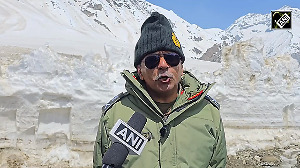At least three persons were killed in sporadic clashes in Bangladesh on Monday during a nationwide general strike called by fundamentalist Jamaat-e-Islami to protest their leaders' ongoing trial for 1971 war crimes.
Witnesses said JI activists visibly took a hit and run strategy in Dhaka and several other cities amid a clarion call by rival protestors at Shahbagh Square to defy the strike.
One pedestrian was killed when a minibus overturned as it was chased by JI activists, who also damaged four buses in the capital. The transport operators defied the JI's strike call expressing solidarity with demands for trial of "crimes against humanity" during the 1971 war against Pakistan.
Another death was reported from central Comilla district where JI activists clashed with police. Witnesses said one person died with bullet injuries after JI protesters went on rampage on the street prompting the police intervention.
The third death was reported from southeastern Cox's Bazar, a stronghold of Jamaat. The victim was a patient who died when JI activists attacked his ambulance.
Many schools in Dhaka were open though with thin student presence while businesses and major shopping centers remained open as the main shop owners association at a press briefing on Sunday said they planned to ignore the call by JI, which was opposed to Bangladesh's 1971 independence from Pakistan.
Visibly shifting from its previous stance, main opposition Bangladesh Nationalist Party (BNP) this time declined to extend its "moral support" to the JI strike call.
Bangladesh parliament on Sunday amended the war crimes law to allow the prosecution to try and punish any organisations, including the JI, a significant move that could pave the way for banning the country's largest Islamic party.
Meanwhile, Dhaka witnessed an intensified security vigil with paramilitary Border Guards and elite anti-crime Rapid Action Battalion that draws members from military, police and other forces, joining police in patrolling streets.
The strike was the first such nationwide hartal called by JI after a special tribunal sentenced the party's assistant secretary general Abdul Quader Mollah to life for crimes like mass killing, rapes and tortures.
The "non-partisan" young protestors rallied at Dhaka's Shahbagh Square demanding death penalty to Mollah and grew in numbers subsequently to stage a round the clock sit-in vigil, which entered its 14th day on Monday.
But the murder of one their leading comrades, 35-year-old architect Rajib Haidar three days ago, flared up the protests.
The Shahbagh protests, initiated primarily by bloggers, also call for boycott of the health, banking and other services being offered by JI-run institutions.
BNP apparently was in a dilemma over the Shabagh protest that mounted pressure on it to severe links with JI as the party feared the young protestors were used by the ruling Awami League to carryout their political agenda.






 © 2025
© 2025